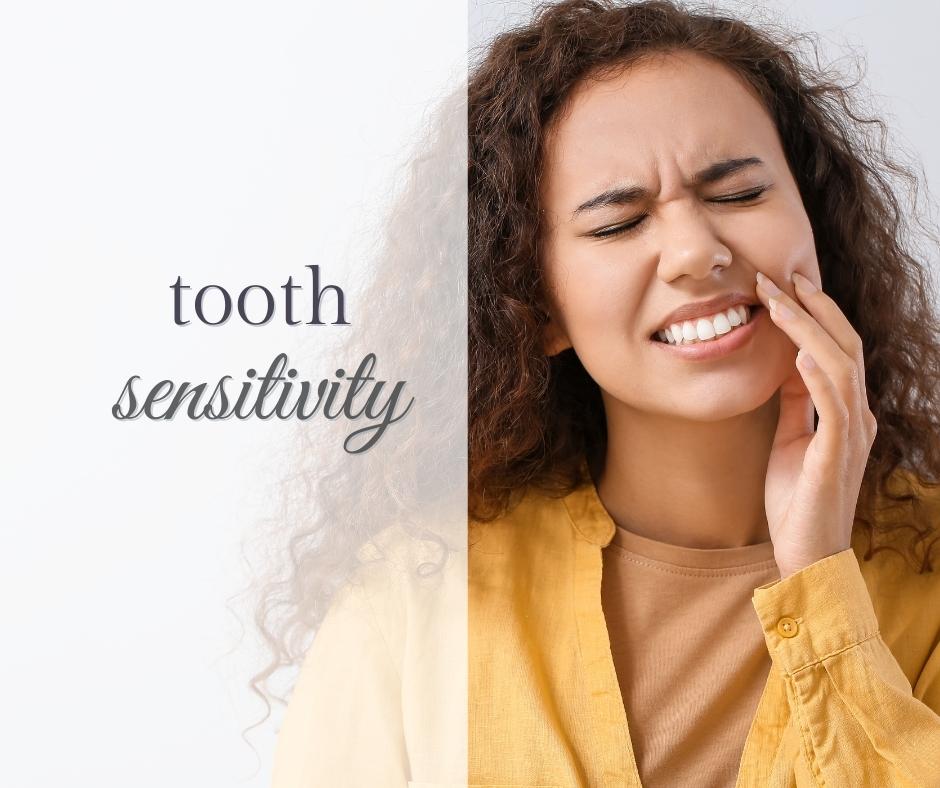
Have you ever been enjoying a nice cold beverage or ice cream cone and suddenly… ouch! You feel a little twinge of sensitivity on your tooth.
For many people, cold air, cold or hot drinks, or sweets can trigger tooth sensitivity. In some cases, sensitivity when eating hot and cold foods or while brushing your teeth can be a warning sign that it’s time to see a dentist.
Tooth sensitivity is often one of the first indicators that something may be wrong with your teeth or gums. Let’s take a moment to learn a little about tooth sensitivity, what causes it, and how to treat it!
Causes of Tooth Sensitivity
Varying factors can cause tooth sensitivity. While some of these causes are less concerning and easily treatable, some reasons may require more involved dental solutions.
If you are someone who notices generalized sensitivity throughout your mouth, you may have thinning enamel or exposed roots. Enamel is the hard outer coating that protects the teeth. Over time, enamel can become thinner. This may result from aggressive brushing with hard bristled toothbrushes, abrasive toothpaste, acidic diets, or acid reflux. When the enamel becomes thin, the inner tooth is less protected and responds more strongly to hot and cold. Exposed roots are another cause of sensitivity and are often related to gum loss or periodontal disease. When the gums recede, whether due to disease or trauma, the tooth’s root surface is exposed and becomes sensitive. Excessive wear and grinding often occur at night without your knowledge and can lead to thinning enamel and gingival recession. In addition, some people have a genetic predisposition to tooth sensitivity which will usually need to be managed rather than specifically treated.
If you have sensitivity on only a few teeth, your body may be telling you that a cavity or a crack has started in your tooth. When cavities or cracks form, cold and hot substances can access areas closer to the tooth’s nerve, creating a twinge of sensitivity. Slight sensations can be an early warning sign of a small cavity or crack. However, lingering or pulsating sensitivity may indicate that the nerve is exposed, and you should see your dentist as soon as possible.
What should I do for sensitive teeth?
The best way to prevent tooth sensitivity is to develop excellent oral health habits and see your dentist at least twice a year. Sensitivity can be reduced by using a soft bristle toothbrush, fluoride toothpaste, and a gentle brushing technique. Fluoride treatments can also be provided by your dentist at your cleaning appointments and will help to strengthen your teeth, prevent cavities, and reduce sensitivity. If your tooth is cracked or has decay, your dentist can resolve your sensitivity with fillings, crowns, root canals, or other treatments as needed. Night guards are an excellent protection for clenching and grinding, that helps to decrease the risk of sensitivity. If gum recession and root exposure are the cause, be sure to use a gentle brushing technique to prevent trauma to the tissue and floss daily. In some cases, more advanced periodontal treatment may be recommended to treat gum loss.
If you experience tooth sensitivity, it is important to have the cause diagnosed to prevent future problems.
At Magnolia Springs Dentistry, we are happy to help treat any of your dental needs with care customized to your specific needs. We are conveniently located in Baxter Village! Call us at 803-456-2404!
